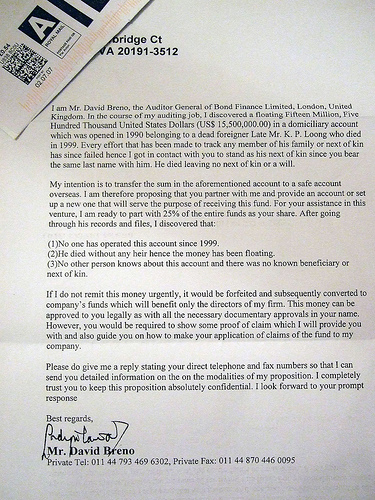

How to Spot And Avoid Advance Fee Fraud Scams

If you receive an e-mail offer that sounds too good to be true, it probably is. Urban legends and hoaxes have been around for centuries, but their popularity is on the rise because the Internet makes it easy to spread fraud e-mails.
Many e-mail hoaxes will trick you into forwarding messages about fake viruses or other fabricated stories. These e-mails waste time, clog inboxes, and might cause embarrassment when they’re proven untrue. But there are other, more insidious types of fraud that might end up costing you a lot of money.
About advance fee frauds
An advance fee fraud is a scam that hooks you with the false promise of large sums of money for little or no effort on your part.
An advance fee fraud is a scam that hooks you with the false promise of large sums of money for little or no effort on your part. Once you’re deeply involved in the scam, you’re asked to pay certain amounts of money to expedite the process. You end up not making a dime.
Here are a few examples of the most popular advance fee frauds:
- A foreign government official would like your assistance in transferring funds and will pay you a hefty commission if you agree.
- You stand to inherit millions of dollars from a relative you don’t remember.
- You’ve won a prize or a lottery (perhaps one from a foreign country) that you don’t remember entering.
Spotting a fraud: 7 signs of a scam
If you think an e-mail you received is a scam, one place to check is the Urban Legends Reference Pages list of examples. However, these scams can come in thousands of different forms.
Here are seven more tell-tale signs of a scam:
- You don’t know the person who has sent you the message.
- You are promised untold sums of money for little or no effort on your part.
- You are asked to provide money up front for questionable activities, a processing fee, or to pay the cost of expediting the process.
- You are asked to provide your bank account number or other personal financial information, even if the sender offers to deposit money into it.
- The request contains a sense of urgency.
- The sender repeatedly requests confidentiality.
- The sender offers to send you photocopies of government certificates, banking information, or other “evidence” that their activity is legitimate (these are fake).

Image extracted from http://www.savingadvice.com/blog/2007/07/17/101623_money-confession-nigerian-scam.html
 Leave a Reply
Leave a Reply 


All Rights Reserved • Powered by juzzhost | Founded by Delson Moo



